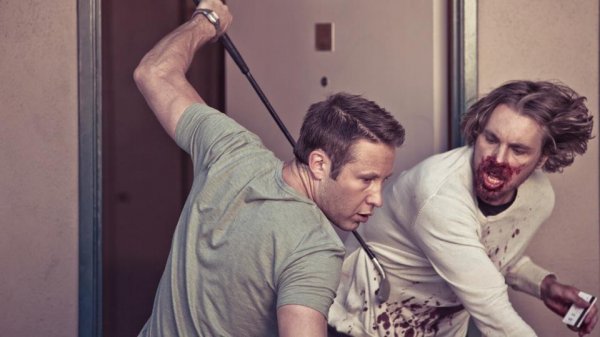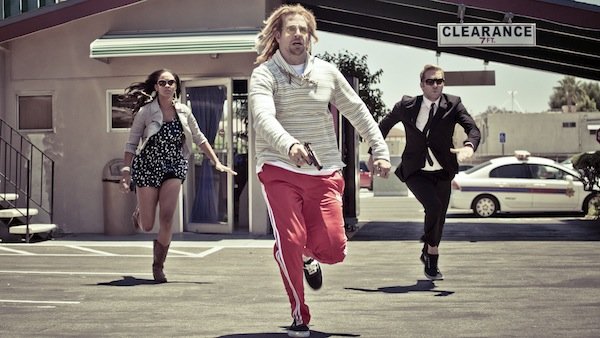Hit and Run Review
Fast cars and comedy have never really gone hand in hand. Movies such as the
Fast and Furious franchise have always been about the cars, with the jokes mostly sticking to characters digging at each other and one-liners.
Hit and Run, on the other hand, is all about the humor — with just a side of car porn.
Hit and Run serves predominantly as a showcase for the comedic style of its creator, actor Dax Shepard. Shepard’s filmmaking debut,
Brother’s Justice, which he also co-directed with partner David Palmer in 2010, went silently, but here he’s convinced his fiancée, Kristen Bell, to co-star and snagged another A-lister in Bradley Cooper to elevate the film’s profile.

The humor in
Hit and Run can best be described as awkward. It’s a lot like
Seinfeld and
Curb Your Enthusiasm in the way it constantly steps back to let the characters verbally break down the tension, event or action that just happened or is happening on screen, only Shepard is less concerned with social taboos and all the characters of “Hit and Run” are a little mentally off in one way or another outside of the central couple.
Shepard plays Charlie Bronson, only that’s not his real name. He lives somewhere in hard-to-find California because he’s in Witness Protection after testifying against some bank robbers a few years back. Since then he’s started a new life and a serious romance with Annie (Bell), who doesn’t know much about his past. When Annie gets an incredible and nearly shoo-in dream job opportunity in Los Angeles — the city Charlie must specifically stay away from — he decides to risk taking her there.
Setting it all in motion is a small contrivance: Annie needs to bring her teaching certificate, which she left in a photo album at her ex-boyfriend, Gil’s (Michael Rosenbaum), house. Gil is still obsessed with Annie and convinced Charlie’s a rapist of some kind because of his shrouded past. Ultimately, he discovers Charlie’s real identity and in hopes of getting Annie back, contacts the very people Charlie must hide from, including Alexander Dmitri, a dreadlocked Cooper with an attitude problem.

It takes some time for all this to build, during which we’re treated to a lot of weirdness. Tom Arnold plays Randy, the incompetent U.S. marshal assigned to protect Charlie who must then take off after him when he leaves town, and to call him a klutz would be a gross understatement. He’s a running punch line in the film, which is fitting because Arnold is sort of a running punch line, but as you’re waiting for the tension to ratchet up in the movie, he’s frustratingly flattening it.
The slow first half of the film will immediately disappoint anyone looking for something high octane with lots of speeding cars and action. There’s plenty of spinning out, chasing and wrecks, plus peeks under the hood for bona fide car nerds, but this isn’t an action movie.
Eventually, Shepard’s style finds its groove in the chaos of Randy, Gil and Charlie’s old gang chasing after him. The characters arguing over trivialities, namely calling each other out on the dumb (and typically violent) stuff they do, works better in contrast with tension and suspense because it becomes less predictable. Before the story really gets going, the humor feels forced and anecdotal because we’re just waiting for Alexander to find out about Charlie and go after him. The script in this sense could’ve used a veteran writer’s assistance to help the plot hit the ground running.

Admirably, the core of the story is way these events test the romance between Charlie and Annie. Shepard and Bell’s real-life chemistry is apparent on screen and the slow beginning includes plenty of legwork to make them people you want to root for. When Annie finally learns exactly who Charlie was and freaks out over it, the two have a very legitimate and believable argument and we yearn for that problem to be resolved, even if the other characters and elements of the film are too borderline psychotic for things to end up any way but happy or in complete ruin.
With the number of oddball supporting characters, random violence, car porn and plenty of meta-talk about relationships, the overall tone of
Hit and Run is ironic. The soundtrack is probably the best example, as it includes Lou Rawls’ recording of “Pure Imagination” from
Willy Wonka and the Chocolate Factory during a car chase sequence, and the film ends with “Let My Love Open the Door,” which has no place in a film unless you’re trying to be cheesy on purpose.
Hit and Run could be a stepping stone to something bigger and better from Shepard, who might find more success if he took his brand to television or simply found a way to keep the energy up in future films so that the jokes will hit harder. In the meantime,
Hit and Run avoids being total late-August junk, even if most will discover it down the road as a surprisingly decent rental.
 The humor in Hit and Run can best be described as awkward. It’s a lot like Seinfeld and Curb Your Enthusiasm in the way it constantly steps back to let the characters verbally break down the tension, event or action that just happened or is happening on screen, only Shepard is less concerned with social taboos and all the characters of “Hit and Run” are a little mentally off in one way or another outside of the central couple.
Shepard plays Charlie Bronson, only that’s not his real name. He lives somewhere in hard-to-find California because he’s in Witness Protection after testifying against some bank robbers a few years back. Since then he’s started a new life and a serious romance with Annie (Bell), who doesn’t know much about his past. When Annie gets an incredible and nearly shoo-in dream job opportunity in Los Angeles — the city Charlie must specifically stay away from — he decides to risk taking her there.
Setting it all in motion is a small contrivance: Annie needs to bring her teaching certificate, which she left in a photo album at her ex-boyfriend, Gil’s (Michael Rosenbaum), house. Gil is still obsessed with Annie and convinced Charlie’s a rapist of some kind because of his shrouded past. Ultimately, he discovers Charlie’s real identity and in hopes of getting Annie back, contacts the very people Charlie must hide from, including Alexander Dmitri, a dreadlocked Cooper with an attitude problem.
The humor in Hit and Run can best be described as awkward. It’s a lot like Seinfeld and Curb Your Enthusiasm in the way it constantly steps back to let the characters verbally break down the tension, event or action that just happened or is happening on screen, only Shepard is less concerned with social taboos and all the characters of “Hit and Run” are a little mentally off in one way or another outside of the central couple.
Shepard plays Charlie Bronson, only that’s not his real name. He lives somewhere in hard-to-find California because he’s in Witness Protection after testifying against some bank robbers a few years back. Since then he’s started a new life and a serious romance with Annie (Bell), who doesn’t know much about his past. When Annie gets an incredible and nearly shoo-in dream job opportunity in Los Angeles — the city Charlie must specifically stay away from — he decides to risk taking her there.
Setting it all in motion is a small contrivance: Annie needs to bring her teaching certificate, which she left in a photo album at her ex-boyfriend, Gil’s (Michael Rosenbaum), house. Gil is still obsessed with Annie and convinced Charlie’s a rapist of some kind because of his shrouded past. Ultimately, he discovers Charlie’s real identity and in hopes of getting Annie back, contacts the very people Charlie must hide from, including Alexander Dmitri, a dreadlocked Cooper with an attitude problem.
 It takes some time for all this to build, during which we’re treated to a lot of weirdness. Tom Arnold plays Randy, the incompetent U.S. marshal assigned to protect Charlie who must then take off after him when he leaves town, and to call him a klutz would be a gross understatement. He’s a running punch line in the film, which is fitting because Arnold is sort of a running punch line, but as you’re waiting for the tension to ratchet up in the movie, he’s frustratingly flattening it.
The slow first half of the film will immediately disappoint anyone looking for something high octane with lots of speeding cars and action. There’s plenty of spinning out, chasing and wrecks, plus peeks under the hood for bona fide car nerds, but this isn’t an action movie.
Eventually, Shepard’s style finds its groove in the chaos of Randy, Gil and Charlie’s old gang chasing after him. The characters arguing over trivialities, namely calling each other out on the dumb (and typically violent) stuff they do, works better in contrast with tension and suspense because it becomes less predictable. Before the story really gets going, the humor feels forced and anecdotal because we’re just waiting for Alexander to find out about Charlie and go after him. The script in this sense could’ve used a veteran writer’s assistance to help the plot hit the ground running.
It takes some time for all this to build, during which we’re treated to a lot of weirdness. Tom Arnold plays Randy, the incompetent U.S. marshal assigned to protect Charlie who must then take off after him when he leaves town, and to call him a klutz would be a gross understatement. He’s a running punch line in the film, which is fitting because Arnold is sort of a running punch line, but as you’re waiting for the tension to ratchet up in the movie, he’s frustratingly flattening it.
The slow first half of the film will immediately disappoint anyone looking for something high octane with lots of speeding cars and action. There’s plenty of spinning out, chasing and wrecks, plus peeks under the hood for bona fide car nerds, but this isn’t an action movie.
Eventually, Shepard’s style finds its groove in the chaos of Randy, Gil and Charlie’s old gang chasing after him. The characters arguing over trivialities, namely calling each other out on the dumb (and typically violent) stuff they do, works better in contrast with tension and suspense because it becomes less predictable. Before the story really gets going, the humor feels forced and anecdotal because we’re just waiting for Alexander to find out about Charlie and go after him. The script in this sense could’ve used a veteran writer’s assistance to help the plot hit the ground running.
 Admirably, the core of the story is way these events test the romance between Charlie and Annie. Shepard and Bell’s real-life chemistry is apparent on screen and the slow beginning includes plenty of legwork to make them people you want to root for. When Annie finally learns exactly who Charlie was and freaks out over it, the two have a very legitimate and believable argument and we yearn for that problem to be resolved, even if the other characters and elements of the film are too borderline psychotic for things to end up any way but happy or in complete ruin.
With the number of oddball supporting characters, random violence, car porn and plenty of meta-talk about relationships, the overall tone of Hit and Run is ironic. The soundtrack is probably the best example, as it includes Lou Rawls’ recording of “Pure Imagination” from Willy Wonka and the Chocolate Factory during a car chase sequence, and the film ends with “Let My Love Open the Door,” which has no place in a film unless you’re trying to be cheesy on purpose.
Hit and Run could be a stepping stone to something bigger and better from Shepard, who might find more success if he took his brand to television or simply found a way to keep the energy up in future films so that the jokes will hit harder. In the meantime, Hit and Run avoids being total late-August junk, even if most will discover it down the road as a surprisingly decent rental.
Admirably, the core of the story is way these events test the romance between Charlie and Annie. Shepard and Bell’s real-life chemistry is apparent on screen and the slow beginning includes plenty of legwork to make them people you want to root for. When Annie finally learns exactly who Charlie was and freaks out over it, the two have a very legitimate and believable argument and we yearn for that problem to be resolved, even if the other characters and elements of the film are too borderline psychotic for things to end up any way but happy or in complete ruin.
With the number of oddball supporting characters, random violence, car porn and plenty of meta-talk about relationships, the overall tone of Hit and Run is ironic. The soundtrack is probably the best example, as it includes Lou Rawls’ recording of “Pure Imagination” from Willy Wonka and the Chocolate Factory during a car chase sequence, and the film ends with “Let My Love Open the Door,” which has no place in a film unless you’re trying to be cheesy on purpose.
Hit and Run could be a stepping stone to something bigger and better from Shepard, who might find more success if he took his brand to television or simply found a way to keep the energy up in future films so that the jokes will hit harder. In the meantime, Hit and Run avoids being total late-August junk, even if most will discover it down the road as a surprisingly decent rental.